
[ad_1]
Windows 11 Hot patching: Availability
The report claims that the latest Windows 11 Dev Channel build is testing a rebootless security update feature for PCs with “Virtualization Based Security” enabled. Once installed, the Windows build string will be updated to “ge_release_svc_hotpatch_prod1.240211-0859.”
The report also revealed that Microsoft is planning to roll out hot patching publicly later this year alongside the release of Windows 11 version 24H2 on x86-64 machines.
If this schedule remains unaffected, ARM64 devices are expected to get support for hot patching in 2025. However, the report didn’t confirm if hot patching will be available to all Windows 11 users, or if it will be reserved for Windows 11 commercial editions such as Enterprise, Education, and Windows 365.
Windows 11 Hot patching: How does it work
According to Microsoft’s documentation, hot patching works by “patching the in-memory code of running processes without the need to restart the process.”
As per the report, Microsoft is planning to use hot patching on Windows 11 to deliver monthly security updates without requiring the user to restart. However, this doesn’t mean that users won’t be required to restart for a pending update ever again.
Hot patching will rely on a baseline update that requires a reboot every few months. This means only four monthly security updates may require a reboot a year. These updates are usually rolled out in January, April, July, and October.
The updates that will roll out in other months will be serviced via hot patching and wouldn’t require a reboot. However, it’s important to note that any major security updates, bug fixes and feature updates can be delivered at any time if necessary and may still require a reboot even outside of the mentioned set of months.
[ad_2]
Source link
